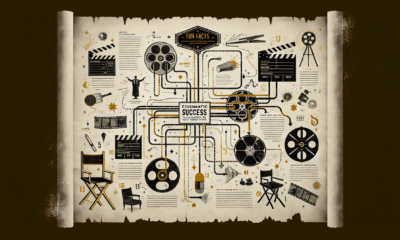Lifestyle
Mastering the Clock: Essential Time Management Strategies for Busy Professionals

Struggling to keep your head above water in a sea of meetings, deadlines, and never-ending to-do lists? You’re not alone! Many busy professionals juggle countless tasks daily, and mastering time management can feel like an uphill battle. But fear not! Here are some essential strategies that can help you reclaim your time and boost productivity.
Understanding the Importance of Time Management
Effective time management isn’t just about squeezing in more tasks; it’s about maximizing the quality of your time. Did you know that according to a study by the American Psychological Association, effective time management can lead to less stress and increased job satisfaction? When you know how to manage your time well, you feel more accomplished and less overwhelmed.
Set Clear Goals
The Power of SMART Goals
One of the foundational blocks of effective time management is setting goals, specifically SMART goals. That means:
- Specific: Be clear about what you want to achieve.
- Measurable: Make sure you can track your progress.
- Achievable: Set realistic targets.
- Relevant: Ensure they align with your broader objectives.
- Time-bound: Set deadlines to keep yourself accountable.
For example, instead of saying, "I want to be better at my job," say, "I will complete three online courses related to my field by the end of this quarter."
Prioritize Your Tasks
The Eisenhower Matrix
Not all tasks are created equal! You’ll want to prioritize them effectively. A useful tool to do this is the Eisenhower Matrix, which categorizes tasks into four quadrants:
- Urgent and Important: Do these first.
- Important but Not Urgent: Schedule these to do later.
- Urgent but Not Important: Delegate these tasks if possible.
- Not Urgent and Not Important: Eliminate or minimize these.
This helps you focus on what truly matters and cuts down on wasted time.
Time Blocking for the Win
Have you heard of time blocking? It’s a simple yet powerful method that involves dividing your day into segments dedicated to specific tasks. Here’s how to do it:
- Choose your tasks: Start with your priority list.
- Set time limits: For example, allocate 1 hour for email responses from 9:00 AM to 10:00 AM.
- Stick to the plan: When the time’s up, move on to the next block.
This creates a structured approach to your day and reduces distractions.
Limit Distractions
Create Your Ideal Workspace
Your environment plays a massive role in your productivity. Here are some simple tweaks to make your workspace less distracting:
- Keep it organized: A clean desk can lead to a clearer mind.
- Limit digital distractions: Use apps like Freedom or StayFocusd to block social media during work hours.
- Set boundaries: Communicate your work hours to coworkers and family to minimize interruptions.
Take Breaks for Better Focus
The Pomodoro Technique
It might sound counterintuitive, but taking breaks can actually enhance focus and efficiency. The Pomodoro Technique is a popular method where you work for 25 minutes and then take a 5-minute break. After four "Pomodoros," take a longer break (15-30 minutes). Not only does this refresh your mind, but it also keeps you engaged.
Learn to Say No
This one can be tough, especially if you’re a people-pleaser, but learning to say no is a crucial skill for time management. Overcommitting can leave you stretched thin and leave little room for your priorities. When presented with new tasks, consider:
- Is this really important?
- Will it help me achieve my goals?
- Can it be delegated to someone else?
Saying no doesn’t make you a bad colleague; it makes you a smart one.
Utilize Technology and Tools
Apps to Keep You On Track
In our tech-savvy world, there are plenty of applications designed for boosting productivity. Here are a few that can help you stay organized:
- Trello: Great for project management and tracking progress.
- Todoist: Helps you manage tasks with easy-to-use checklists.
- Google Calendar: Perfect for scheduling and reminders.
Using these tools can streamline your workflow and keep you organized.
Reflection and Review
At the end of each week, take some time to reflect on your accomplishments and challenges. Ask yourself questions like:
- What did I achieve?
- Where did I struggle?
- How can I improve for next week?
This self-reflection helps you continuously refine your time management strategies.
Conclusion: Time is Your Most Valuable Asset
Mastering time management is essential for any busy professional. By implementing these strategies—setting clear goals, prioritizing tasks, using time blocks, limiting distractions, and reflecting on your progress—you can unlock more time in your day for what truly matters.
So go ahead, take control of your time, and watch your productivity soar! And if you’re looking for more ways to boost your professional life, check out our Productivity Hacks and Work-Life Balance Tips.
Resources for Further Learning
For more research on effective time management, check out this informative article on Pew Research about productivity trends in the workplace.
By mastering just a few essential strategies, you can transform how you manage your time, leading to increased job satisfaction and reduced stress. What are you waiting for? Start implementing these tips today!
-

 News22 hours ago
News22 hours agoTeenage US Citizen Records Brutal Arrest by Immigration Agents Who Told Him, ‘You Have No Rights’
-
News21 hours ago
Maltese Police Officers Participate in Operation in the Black Sea
-

 Business22 hours ago
Business22 hours agoNavigating the Economic Landscape: Key Insights from Today’s Business Headlines
-

 News20 hours ago
News20 hours ago“Honoring Ukraine: A Tribute” (July 26, 2025) — dynamo.kiev.ua
-

 Entertainment22 hours ago
Entertainment22 hours agoCinematic Success: Fun Facts About Movies That Shaped the Film Industry
-

 Business19 hours ago
Business19 hours agoThe Top 10 Business Opportunities to Watch in 2025
-

 Business21 hours ago
Business21 hours agoNavigating the Shifting Sands: Key Global Economic Trends for 2024
-

 News19 hours ago
News19 hours agoEnviMin Showcases Vacaresti Natural Park to Her German Counterpart
